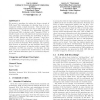Free Online Productivity Tools
i2Speak
i2Symbol
i2OCR
iTex2Img
iWeb2Print
iWeb2Shot
i2Type
iPdf2Split
iPdf2Merge
i2Bopomofo
i2Arabic
i2Style
i2Image
i2PDF
iLatex2Rtf
Sci2ools
110
click to vote
WWW
2006
ACM
2006
ACM
One document to bind them: combining XML, web services, and the semantic web
We present a paradigm for uniting the diverse strands of XML-based Web technologies by allowing them to be incorporated within a single document. This overcomes the distinction between programs and data to make XML truly "self-describing." A proposal for a lightweight yet powerful functional XML vocabulary called "Semantic fXML" is detailed, based on the well-understood functional programming paradigm and resembling the embedding of Lisp directly in XML. Infosets are made "dynamic," since documents can now directly embed local processes or Web Services into their Infoset. An optional typing regime for infosets is provided by Semantic Web ontologies. By regarding Web Services as functions and the Semantic Web as providing types, and tying it all together within a single XML vocabulary, the Web can compute. In this light, the real Web 2.0 can be considered the transformation of the Web from a universal information space to a universal computation space. Cat...
Functional Xml Vocabulary | Internet Technology | Semantic Web Ontologies | Single Xml Vocabulary | WWW 2006 |
Related Content
| Added | 22 Nov 2009 |
| Updated | 22 Nov 2009 |
| Type | Conference |
| Year | 2006 |
| Where | WWW |
| Authors | Harry Halpin, Henry S. Thompson |
Comments (0)

